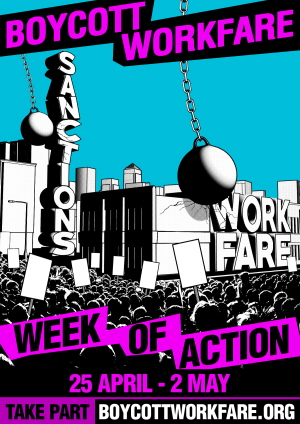25 April to 2 May: international week of action against workfare and sanctions. Come join us!

| In het Nederlands En Français Translation: |
The British organisation Boycott Workfare calls for an international week of action against workfare and sanctions for people claiming benefits, from 25 April until 2 May. Doorbraak supports this initiative and also calls people and organisations in the Netherlands to take action. In both countries already several actions have been planned. Join us, or organise something in your own neighbourhood!
This is how it’s supposed to be: either you have a paid job and you get a decent salary. Or you don’t have a job and you can claim benefits. But the government now forces us to work for nothing, saying it’s to help us find a paid job. Under the regime of the job centres with sanctions and unannounced home visits. Of course you can refuse to do unpaid forced labour, but then you won’t get money any more, and you can’t buy your food and pay your rent. So there is no real choice to refuse and that’s why we call it forced unpaid labour.
| The actionsIn the UK, already four actions have been announced. Dutch actions and activities are being announced now. Do you want to organise something? That would be great. Please let us know. You can email us at dwangarbeid@doorbraak.eu. Probably we can help you in many ways.
Actions in the Netherlands
Actions in the UK
|
Substitution of jobs
Every hour of labour done by someone on workfare can’t be done any more by a person with a paid job. This is how the government allows the destruction of jobs and the creation of unemployment. They cut their budgets by firing employees and have benefit claimants do the work for free. Workfare also hands companies free labour. And after having claimants work for them for a few months, these companies exchange them for new claimants. Companies already making millions of profit, like supermarkets, employment agencies and cleaning companies, take advantage of this.
Doing something in return
The government now also forces claimants to ’volunteer’, because we have to ‘do something in return’ for claiming benefits. Voluntary work is very valuable, but only if it is really voluntary. Now it is becoming a second form of workfare, next to the ‘regular’ type of workfare that’s supposed to help us find a real job. This undermines core charitable values and genuine volunteering. Voluntary organisations that participate in these practices profit from force, and put claimants at risk of sanctions and destitution, willingly or not.
Fear
A lot of claimants live in fear of sanctions. These sanctions, and the risk to be sanctioned, get higher all the time. Claimants for instance have the obligation to supply any information to the jobcentres “which could be relevant” for claiming benefits. But this could be anything and a lot of claimants are being sanctioned because they didn’t supply enough information. This regime of sanctions and workfare is also meant to scare people who still have a paid job. Be good and don’t get fired otherwise we’ll get you into workfare, is the message. People applying for benefits are discouraged to do so by first letting them do forced unpaid labour. People who surmounted all obstacles, and got benefits, are depicted in the media as lazy and not willing to work. Like paid jobs can be found anywhere, like there is no crisis. Like there is nothing more in life than a paid job.
What we do in return: resistance
In spite of fear of sanctions and other problems, more and more claimants and sympathisers are resisting. They tell their stories, organise themselves and take action. This is how small individual protests grow into collective resistance. In multiple cities action committees have been set up and they have achieved small victories. Also as a result of our bottom-up resistance, some political parties and unions are getting increasingly opposed against workfare.
What we want
As claimants
1. Stop workfare
2. Away with all obstacles when applying for benefits
3. No sanctions
4. Stop the obligation to supply ‘all information that could be relevant’
5. Higher benefits
6. Stop stigmatising claimants
As workers
7. Free choice of employment
8. Salary according to collective agreements
9. Normal worker’s rights
10. Good working conditions
In general
11. Enough means to live for everyone, without conditions
12. An end to the propaganda for work ethic
Eric Krebbers
